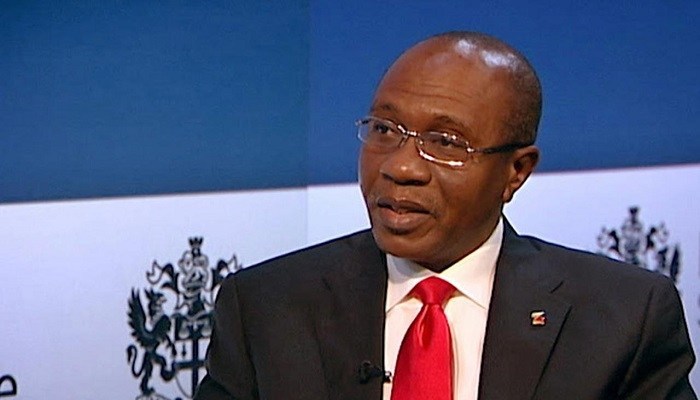The Governor of the Central Bank of Nigeria (CBN), Governor Godwin Emefiele, might have made history as the only governor to be reappointed for a second term since the return to democratic rule.
Emefiele would also be remembered as the governor who experienced two recessions.
- Soldier kills self after killing customs officer at Seme
- Gas conversion will reduce 20% operational costs for coys
Under him, the CBN metamorphosed from merely minding interest rates and inflation to a multi-sectored stakeholder.
Emefiele has made a staunch effort to promote monetary policy and exchange rate stability, says Murega Mungai, Trading Desk Manager at AZA, Nairobi, Kenya. AZA is Africa’s biggest non-bank currency broker, transacting more than $1bn annually.
Mungai said, “We saw this very early on with the introduction of the investors and exporters window which allowed investors to access foreign exchange at prevailing market rates. His policies have also focused on improving access to credit for MSMEs, intervention in the agricultural sector and other ways to diversify the economy and cushion it against a crash in oil prices.
“As the banks’ regulator, he drove an increase in capital adequacy ratios from 11 to 16 per cent in 2019 and a 20 per cent increase in liquidity.”
Emefiele’s biggest scorecard in intervention was orchestrated by the COVID-19 pandemic. In line with its response plan, the CBN created credit facilities for the healthcare (N100bn); Targeted Credit Facility (N100bn); and Manufacturing Sector (N1tn).
From January, 2021 to date, N157bn has been disbursed by 29 real sector projects under the RSSF-DCRR; while N857bn has been disbursed for 234 real sector projects under the RSSF-DCRR (inclusive of CMIS) from inception (November, 2018) to May 28, 2021.
From January, 2021, to date, N26bn has been disbursed for 10 projects under the COVID-19 Manufacturing Intervention Scheme (CMIS); while N255bn has been disbursed for 78 projects under the CMIS from January, 2020, to May 28, 2021.
91 healthcare projects have been funded to a tune of N97bn under the Healthcare Sector Intervention Facility (HSIF) as at May 28, 2021.
The sum of N111bn has been disbursed under AGSMEIS to 29,023 beneficiaries as at May 28, 2021, while the sum of N3.2bn has been disbursed under CIFI to 341 beneficiaries as at May 28, 2021.
Daily Trust further learnt that the sum of N253bn has been disbursed under TCF to 548,345 beneficiaries.
Similarly, the sum of N3bn has been disbursed under the national Youth Investment Fund (NYIF) to 7,057 beneficiaries.
However, Emefiele has come in for criticism for not communicating with the market, most notably after devaluing the naira’s official rate recently, says Mugai.
The bank’s unorthodox, as well as interventionist model that moves away from just ensuring price stability, drew the ire of analysts at different times.
Professor of Economics at Pan Atlantic University in Lagos, Bongo Adi, said: “Over the years, our experience here in Nigeria is that CBN governors have sometimes taken positions that rankled the government. But we haven’t experienced such under him. This has led to some labeling the CBN under him as the government’s piggy bank.
“The pro-socialist bent of Aso Rock appears to be backed by his monetary policy which they refer to as unconventional and find reasons in their enabling act to justify at each call,” adding that, “The Nigerian situation is a challenging one.”
It is easy to criticise Emefiele, though, says Adi. “The fact, however, is that the Nigerian situation is a challenging one. The market isn’t always to be trusted to work; the government needs to ‘improve the market outcome.’ But the experience is that the government can complicate the situation. Perhaps, sandwiching between the devil and the deep blue sea may not be a choice to be made, after all. It might be the only way.
Kalu Ajah, Chief Executive Officer at AfriSwiss Capital Assets Management Limited in Abuja, in his assessment, said: “The CBN has pursued a ‘strong naira’ policy and had sought to dampen imports.
“Well, imports have not declined and the naira is far from ‘strong’. One wonders if the import restrictions on items and capital controls were necessary or if the CBN should have devalued the naira earlier. ”
He argues that the bank under Emefiele has shirked its primary responsibility of ensuring price stability and has embraced a more developmental role in the hope of naira stability.
Nigeria’s first Professor of Capital Market and Abuja Chairman of the Chartered Institute of Bankers of Nigeria (CBN), Uche Uwaleke, said: “Emefiele’s seven years have been quite impactful I must admit. In the area of monetary policy, the exchange rate has been relatively stable while the rise in inflation has been due in large part to non-monetary factors.
“Also, the demand management measures introduced by the CBN under Emefiele, including the forex restrictions on certain commodities, have promoted import substitution and helped the value of the naira.”
He further posits that under Emefiele the apex bank’s development finance initiatives gained traction with interventions in several sectors of the economy, especially agriculture and SMEs.
“Worthy of mention is the CBN’s Anchor Borrower Programme which has boosted domestic agric production, facilitated job creation and forex conservation,” he adds.
He said, under Emefiele, played and was still playing a major role in the fight against the COVID-19 pandemic with massive interventions in the health sector.
“Equally, under Emefiele, the financial system has been largely stable with improvements recorded in prudential ratios such as NPLs, Capital Adequacy, as well as liquidity ratios.”
Emefiele unveiled a five-year plan shortly after his reappointment for a second term in May, 2019. The plan targets double-digit growth in one of Africa’s largest economies.
The plan includes domestic macroeconomic and financial stability, fostering the development of a robust financial payment system infrastructure seen as increasing access to finance to all Nigerians, thus and raising the financial inclusion rate in the country.
He also pledged to continue working with Deposit Money Banks (DMBs) towards improving access to credit for smallholder farmers, MSMEs, as well as consumer credit and mortgage facilities.
The Director General of the Lagos Chamber of Commerce and Industry (LCCI), Dr Muda Yusuf said: “Mr Emefiele has been very passionate about promoting self-reliance to reduce our import dependence and conserve foreign exchange. Some companies have taken advantage of this CBN funding window to fund real sector investments.
Dr Yusuf said the CBN boss has demonstrated exceptional commitment to development finance, providing long term funds to the real sector at single digit interest rate.
“But there has been a disproportionate emphasis on demand management strategy to protect reserves. It is desirable to see much greater focus on supply side strategies to boost forex inflows and stabilise the exchange rate. This could also improve the liquidity in the foreign exchange market,” he said

 Join Daily Trust WhatsApp Community For Quick Access To News and Happenings Around You.
Join Daily Trust WhatsApp Community For Quick Access To News and Happenings Around You.


